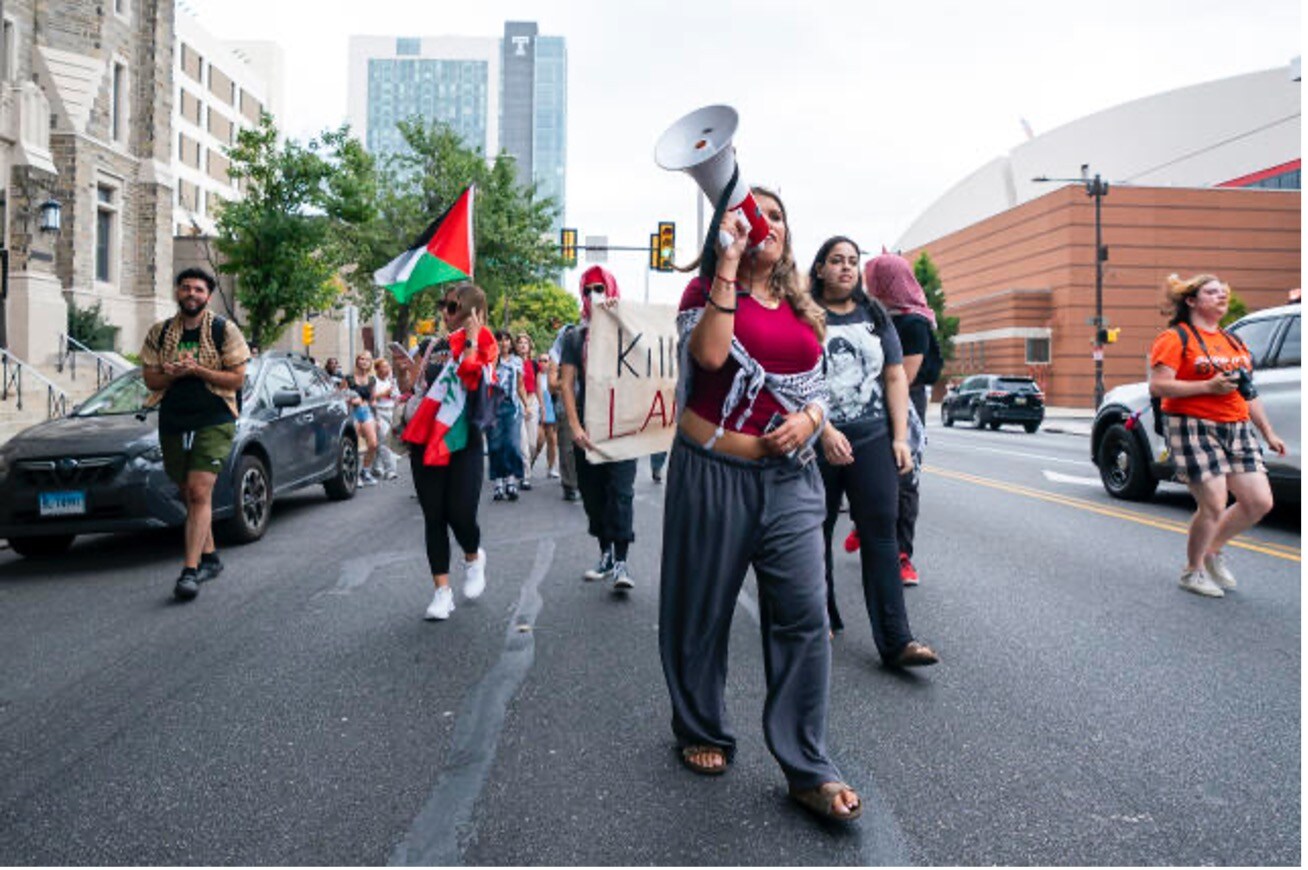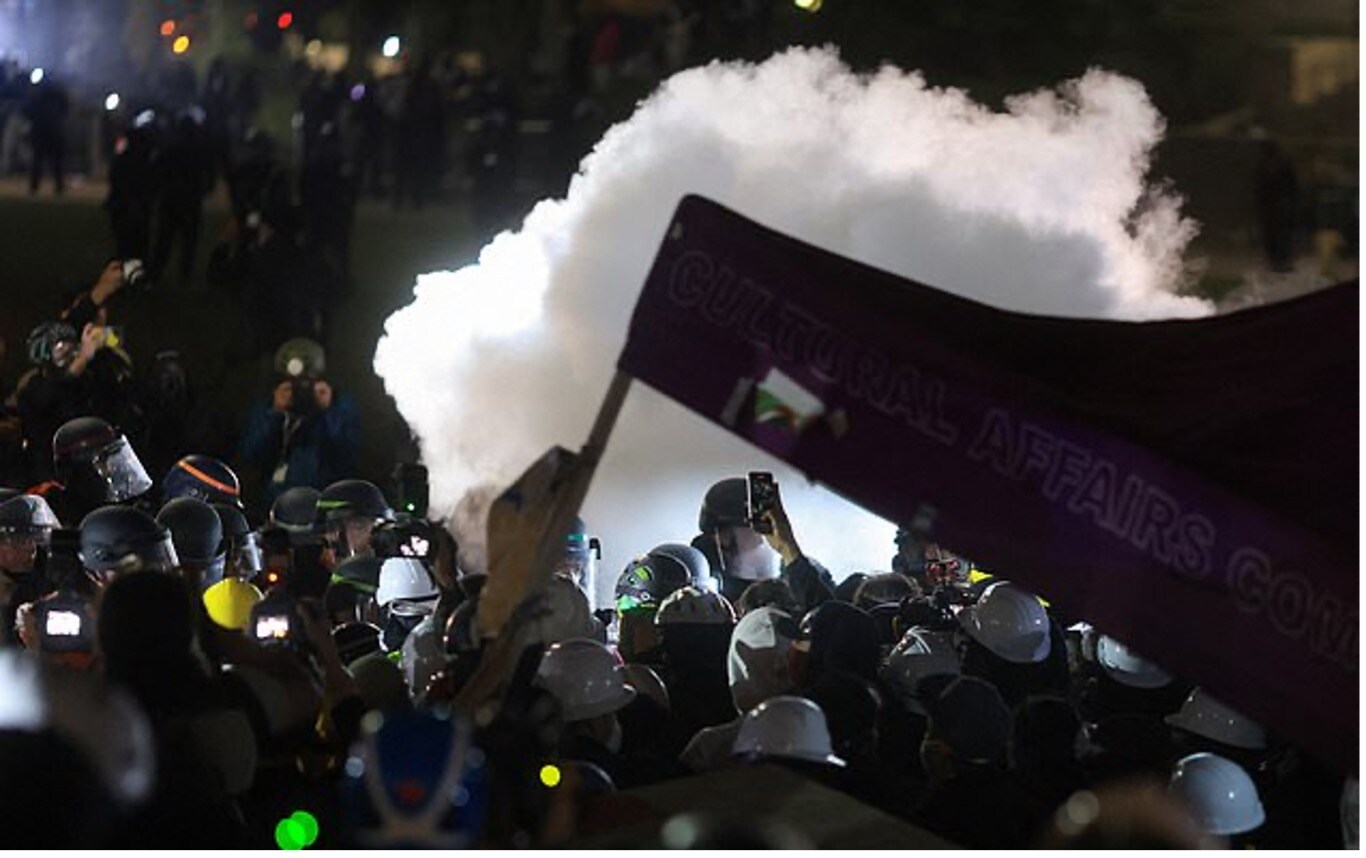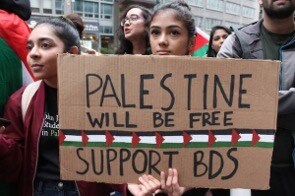In a significant display of solidarity and political protest, over 150 people gathered at the University of Southern California (USC) on Thursday to demand the university divest from Israel. The protest, part of a national day of action organized by Students for Justice in Palestine (SJP), highlighted growing frustrations among students and faculty over USC’s financial ties to companies and entities linked to Israeli human rights abuses.
Protesters, many wearing keffiyehs and face coverings, convened at Hahn Plaza, strategically aligning the demonstration with the university’s bustling career fair. Banners emblazoned with slogans like “Free Palestine” and “USC Funds Genocide” could be seen throughout the crowd as chants echoed for over three hours, calling for the university to heed the Boycott, Divestment, Sanctions (BDS) movement's demands.

This marked the largest campus demonstration since the spring semester's encampments, with protesters staging a sit-in at the iconic Tommy Trojan statue before being moved by the Department of Public Safety (DPS). DPS, having anticipated the protest, fenced off the area and formed a human barrier to enforce university policy and ensure access to fire lanes.
Just days prior, USC student activist groups organized a vigil to mourn the more than 40,000 Palestinians killed since October 7. The vigil, held outside the main campus entrance, featured hundreds of names laid out on large sheets of paper, surrounded by candles and lanterns. Attendees shared stories, poems from Gaza, and renewed calls for the university to divest from Israel and suspend academic exchange programs.
Many protesters voiced concerns over what they saw as the university's restrictions on free expression. A media liaison for USC SJP, speaking anonymously out of fear of academic retaliation, criticized the heavy police presence during the event. “There’s an exceptional amount of police presence to kind of intimidate students,” the liaison said. “It’s absolutely not going to work, and yeah, we just continue to fight for divestment.”
USC’s administration had previously issued statements emphasizing that while the university supports students’ right to express their opinions, it will strictly enforce its policies. At the start of the academic year, the Office of the President released a statement urging students to follow university rules designed to prevent disruptions to campus operations. However, this approach did little to calm student dissatisfaction, with protesters accusing the administration of stifling voices that challenge established narratives.

Max Rubenstein, a sophomore majoring in international relations, expressed concern over the growing divide within the campus community. “It feels like, over the last year, we’ve kind of forgotten how to talk to one another,” he said. “I’ve seen people who refuse to understand where the other side might be coming from.”
Calls for divestment at USC are part of a broader movement led by the BDS campaign, a Palestinian-led initiative that began in 2005. The BDS movement seeks to exert economic pressure on Israel by encouraging organizations, including universities, to withdraw investments from companies complicit in what activists describe as Israeli apartheid. USC SJP and the Divest from Death coalition have framed the university’s investments as complicity in the violence against Palestinians.
John Parker, a coordinator for the Harriet Tubman Center for Social Justice, praised the demonstration and the dedication of the students involved. “[It’s] very inspiring when you have so many youth and students coming out and refusing to go with the lies and risking their careers,” Parker said.
The protest also shed light on what many perceive as a double standard in how free speech is handled across American universities. Despite the U.S.’s global promotion of free expression, many students at USC felt their voices were being silenced. Critics of the university’s response pointed to a broader pattern within American institutions, where advocacy for Palestinian rights often faces more restrictions than other causes, such as social justice or climate change activism.
“There’s been quite a bit of an attack on free speech, and I think that’s a big thing we’re pushing back on,” a USC SJP media liaison said during the vigil. “USC has clearly demonstrated that they are against any speech that doesn’t pertain to their own interests.”
The protests at USC reflect growing dissatisfaction among American youth with U.S. foreign policy, particularly its unwavering support for Israel. For many demonstrators, their activism was not just about USC’s investments but also a critique of the broader U.S. role in the Israeli-Palestinian conflict. Palestinian advocacy groups have repeatedly pointed out how U.S. military and financial aid has exacerbated the violence, a point emphasized during both the protest and the vigil.

For those attending the vigil, the goal was to humanize the staggering loss of life in Gaza. Austen Cooper, a junior majoring in cinema and media studies, said that learning the names of those killed made the crisis more personal. “It’s important for everyone to learn the names and faces of people who have lost their lives so you see these martyrs as human beings and not just numbers,” Cooper said. This sentiment was echoed by community member Linda Baughn, who highlighted the emotional toll of witnessing the ongoing violence. “The scale of death is overwhelming and devastating, and it’s impossible to maintain one’s equilibrium when we’re living through a genocide,” Baughn said.
These statements point to a deeper frustration with how U.S. media and political institutions have framed the conflict, often presenting it as a balanced struggle between two sides rather than acknowledging the disproportionate loss of Palestinian lives and the systemic inequalities fueling the violence.
As protests and vigils at USC continue to gain momentum, the university faces increasing pressure to address the demands of its students and faculty. Activists from the Divest from Death coalition and other groups have vowed to persist in their efforts until the university takes meaningful action.
While USC remains firm in its policies, the events at the university reflect a broader national movement seeking to challenge dominant narratives around U.S. involvement in international conflicts. As more students across the country rally for divestment and human rights, the role of U.S. foreign policy and its impact on domestic dissent will remain under scrutiny.







